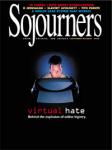Jesus is serious. John Dear became convinced of that during a pilgrimage to the Holy Land in the summer of 1984, as Israeli jets flew above him and dropped bombs on Lebanon. It was a few months before Dear entered the priesthood, and he had been meditating at the Chapel of the Beatitudes above the Sea of Galilee, he writes in Jesus the Rebel, Bearer of God’s Peace and Justice.
Dear looks to the gospels to explain his understanding of Jesus’ seriousness. He highlights specific narratives—from the beginning of Christ’s public ministry through the crucifixion and resurrection and post-resurrection appearances—to develop a portrait of Jesus who is beloved and contemplative. He is also radical and committed to nonviolent acts of resistance to an evil, militaristic state and the hypocritically pious authorities of his institutionalized religion. Christ’s example of revolutionary nonviolence, the author believes, calls all who would be his disciples to resist similar evil and hypocrisy.
Dear—a peace activist, author of several books on the theology of nonviolence, and director of the interfaith pacifist group Fellowship of Reconciliation—writes resolutely and directly without resorting to the latest divinity school lingo. He possesses a wonderful ability to make the gospels plain and accessible. His commentaries are enlivened by his years of studying the gospels—and trying to live their full implications. The balance of study and the lessons derived from experience—his own and that of others he believes exemplify gospel nonviolence—yield some uncommon insights that compel the reader to see the gospels in new ways.
His analysis of Christ’s raising Lazarus from the dead is a good example. In this narrative, Dear argues that the Lord, in a sense, issues three new commandments: "Take away the stone of our despair"; "Lazarus, come out," which encourages us to liberate ourselves from death’s power; and "unbind him and let him go," which challenges us to set free the weak and those held captive by the culture of death. By following these commandments, Dear believes, we can learn to hope and to renew our commitment to the gospels.
YET DESPITE THE book’s many strengths—Dear’s compelling arguments informed and reinforced by his prophetic witness are chief among them—it is difficult to assess its ultimate value. Books about Jesus invariably invite objections from readers whose interpretations of what Christ meant is at odds with the author’s. And that is the case with Jesus the Rebel.
Dear views Jesus as absolutely committed to nonviolence. But he would get an argument from many when he discusses the scene in Mark’s gospel where Christ overturns the moneychangers’ tables in the temple. Dear believes that this is a nonviolent act of civil disobedience against the Jewish people’s complicity with the Roman oppression of the poor. Because Christ didn’t physically hurt anyone by this action, Dear insists that it’s nonviolent in spirit. Some argue that an action doesn’t necessarily have to harm others physically to be violent.
When breaking open the gospels, it’s better to err on the provocative side than the tepid one, and Dear is provocative. But he occasionally takes readers where they may be reluctant to follow. "Does this mean," he asks at one point, "that Christians cannot be employed by the Pentagon, the police, or nuclear-weapons manufacturers?" Dear concludes, "We (Christians) will refuse to carry weapons, even for the noblest reasons, and we will not work for any institution that inflicts violence." This will likely strike many readers as a unnecessarily confrontational assertion.
When speaking of the benefits and requirements of discipleship, Dear uses verbs such as "will" and "are." But verbs such as "should," "try," and "strive to" may have helped readers better relate to the author’s vision. Some suggestions from Dear’s experience about what to do when doubt, fear, and weakness undermine our best intentions to follow Christ would have helped readers see that committing one’s life to gospel nonviolence is real and possible, if painful and difficult. The gospels are not fanciful or utopian.
As commendable as Jesus the Rebel is, Dear may have persuaded more readers of his argument if he’d left more room for their ambivalence.
CHRIS BYRD is a veteran social justice activist, freelance writer, and a native of Washington, D.C.
Jesus the Rebel, Bearer of God's Peace and Justice. Dear, John. Sheed and Ward, 01/01/00.

Got something to say about what you're reading? We value your feedback!